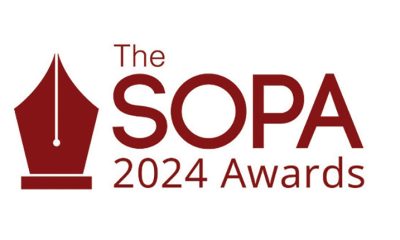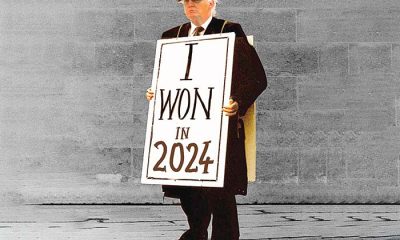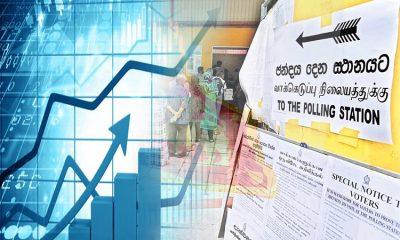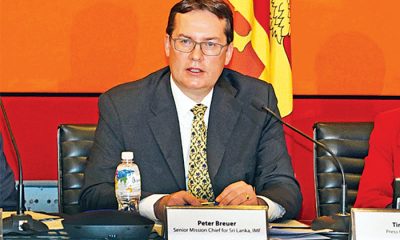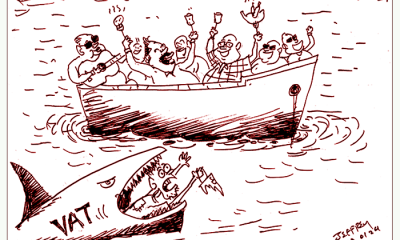Features
Democracy a Global Sine-Qua-Non Social-Liberal-Electoral or Whatever

by Kumar David
Apologies for the untidy title where I have coupled democracy with descriptors that convey different implications. Social-democracy underscores livelihood concerns and the circumstances of the underprivileged. Liberal-democracy is about freedom of expression, the rule-of-law, Hobbes, Locke and all that. The simplest minimum is Electoral Democracy which demands free and fair elections and change of government by universal suffrage. We must reject all contrivances that cramp freedom – fascisms, one party states, presidents who hang-on for decades like Stalins, Hitlers, Mobutus, Idi Amins, Pinochets and such like. I don’t want to get dragged into classifying Lenin and Chairman Mao – the issues are too complex.
To get on with my topic: The present is an excellent conjuncture in which to examine a dramatic shift in global events. The post-WW2 world order, dominated by the United States and its Western European allies plus Japan and a few Anglophone states is unravelling because of a catastrophe in the Middle East (Palestine/Israel) and defeat in the Ukraine.
Nobody in his right senses including that blabbering dotard in the White House now see any possibility of a lasting solution in the Middle East except by the creation of a Palestinian state alongside Israel whose right to continued existence I do not contest. Obama went out of his way to issue a long statement a few days ago pressing for a ‘Two State’ solution. The Islamic world is aflame and even South American countries Chile, Columbia and Bolivia have cut diplomatic ties with Israel. My regular readers will legitimately expect me to devote an essay to this global transformation, so here goes.
Hamas’s attack was terrorist – those who perished were civilians and bystanders – but it scored a political victory by humiliating Israel’s military and its intelligence agencies. In its response Israel is guilty of war crimes in plain sight; it is genocide, and ethnic cleansing is a crime against humanity. More than 10,000 have been killed, hospitals bombed, staff of UN Agencies decimated and a child is killed every ten minutes by Israel’s brave military.
Israel seeks to drive about two million Palestinians in Gaza and the West Bank out their homes and livelihoods. Some Jews say in private that the Palestinians are a problem and should be removed to some other place. The whole of the Abrahamic expanse is the Holy Land promised by God in the Old Testament to his Chosen People, the Children of God, the land of Moses and the Prophets, the site of the Temple of Solomon and their home since return from Babylonian Captivity.
Some Jews do not see this as genocidal or a war crime but as the fulfillment of prophesy; such is the supremacy of religion in the human mind. In a televised nation-wide TV broadcast at the end of October Netanyahu called the Palestinians “Amalek”, a term unfamiliar to those who are not -Jews, so here is the relevant Biblical quotation from I–Samuel 15.3: “Now go and smite the Amalek, and utterly destroy all that they have, and spare them not; but slay both man and woman, infant and suckling, ox and sheep, camel and ass”. Israel’s genocidal intentions could not be more vivid!
The Role of the United States
The USA is a Jekyll and Hyde split-personality if one contrasts its democratic internal polity and the global reach of its military and financial might. Despite obvious limitations internally, it is a democracy from Lincoln’s Emancipation Proclamation (1863), a Dr Jekyll. Free elections, a free press, right to dissent and protest, an elected Congress, a constitutionally empowered Judiciary. But good heavens internationally its Mr Hyde persona is astounding. It has 170,000 troops and top of the range hardware (nuclear weapons, aircraft carriers and star-wars technology) stationed overseas.
Its military dominates the world with mighty overreach. The number of coups that the CIA has engineered overseas, mostly in Central and South America, are legion, plus numerous attempts to assassinate Castro including at the instigation of President Kennedy and his brother Attorney General Robert with whom JFK also shared some spicy delicacies.
Wikipedia estimates that the US has overthrown 64 foreign governments. Right now it is hand in glove with the Netanyahu Government to carry out overt genocide of the Palestinians. Though it is obscene and oxymoronic to call Israel fascist, no sensible person, many Jews in the US included deny that it is a party to ethnic cleansing. But damn! Between the US and Israel who is the leader who the disciple? Israel does not count for a fart without American armaments, nuclear knowhow and advanced technology, not to mention trillions of dollars of congressionally approved financial grants.
Israel is nothing without America, but the interesting question is whether it is an essential tool for the furtherance of the strategies of US imperialism in the global arena. Remember Goethe’s story of an arrogant “Sorcerer’s Apprentice”, a novice who arrogates to himself tasks for which he is unfit while the master is otherwise busy? Yes, it seems oxymoronic to call Israel fascist but there is no denying that its actions in Palestine after the Hamas terrorist attack of October 7 is genocide, a war crime and a violation of human rights. See the attached map of how the homelands of the Palestinian people have shrunk (ethnic cleansing) from 1948 to today.
Now to the crux of the contradiction. Can the US be described as undemocratic? As I said a moment ago despite limitations it is a democracy – free elections, a free press, right to dissent and protest, an elected Congress, a constitutionally empowered Judiciary. My point is that despite limitations (gun-trotting cops, throttling of blacks, FBI overreach, Trump intoxicated MEGA-mania, insane gun violence and more), American society is in the final analysis is, internally, a capitalist liberal democracy. Another dichotomy is well illustrated by the fact that 89% of US Congressmen and women, including progressives like Bernie Sanders, hold dual US-Israeli citizenship. The first page of a list of dual citizens is reproduced with this article.
Strategic Topics
This essay has given much attention to strategic concerns which I will round off by commenting on six important additional matters.
· The Hamas attack and Israel’s response have focused the attention of not just the Middle East and Muslims but the whole world on the Palestine-Israel tinder box. The US is in hot water at home and abroad, Russia is developing a not yet entirely clear game plan, Iran is threatening to intervene, China has backed the Palestinian cause, the Saudi-US relationship has soured with the former expressing dissatisfaction with America, and even China has condemned the US. Hamas could not have even in its wildest dreams imagined such a windfall!
· Pro-ceasefire and pro-Palestinian rallies on the streets of London, Paris and Washington DC are large and growing. In the capitals of Muslim countries the demonstrations are huge.
· Erdogan referred to “Israeli barbarity”. Turkey’s importance cannot be overstated. It has the second largest army after the US in NATO and the country is an industrial powerhouse whose economy is as large as the UK or France. . Its military exports are huge and varied and include tanks, artillery and drones. It is the world’s largest exporter of military drones whose quality is excellent. Pakistan has expressed its willingness to export nuclear weapons to Turkey. There is some talk of naval cooperation with Russia which is likely and speculation of Turkey providing a pathway for a million Russian troops to crossover into the Middle East which I think is a pipedream.
· Hypersonic missiles: A new generation of missiles packed with on-board electronics have been developed. US technology is obviously the world leader but Russia and China are not far behind. The old ICBMs were “dumb”. Once launched they would follow a path fixed by gravity and the laws of physics and could be intercepted before reaching the target such as an “Iron Dome”, an aircraft carrier, or a population centre. (Some ICBMs split into multiple warheads and made interception more difficult). Hypersonic missiles however weave and twirl. Their on-board electronics makes them elusive and they travel at speeds above Mach 1. They come in many sizes and have had excellent success against tank columns, ships and all sorts of military and civilian targets.
· Compact new fusion (hydrogen) bombs are now under development by the US military in an $8 billion programme to build a gravity bomb called the B61. It is a smallish slim device (about 5ft long and 10in in diameter) to be dropped from an airplane. There will be variants ranging in power from a Hiroshima-Nagasaki 20 kiloton size up to a powerful one megaton (1000 kiloton) device. Obviously they are not intended for full scale war against Russia or China but will be very useful in small theatres like the Middle East.
· Some of my buddies’ muse that Armageddon is round the corner and the Third World War is on the way. I tell them to consult Nostradamus.
The economy
Such massive happening on the strategic side are no doubt accompanied by global financial transformations as well. I do not intend to say anything substantive on the topic. What is hard to miss when you are here (I am temporarily in California for medical reasons) is that ordinary people are finding it hard to get by, especially in the last six months. The most pressing concerns are increasing prices, inability to repay student loans, cutback in child-care support, alarming increase in single-parent families (usually mothers) and a breakdown of marriages. Maybe I will have time to write about this topic before I leave.
Features
Crucial test for religious and ethnic harmony in Bangladesh

 Will the Bangladesh parliamentary election bring into being a government that will ensure ethnic and religious harmony in the country? This is the poser on the lips of peace-loving sections in Bangladesh and a principal concern of those outside who mean the country well.
Will the Bangladesh parliamentary election bring into being a government that will ensure ethnic and religious harmony in the country? This is the poser on the lips of peace-loving sections in Bangladesh and a principal concern of those outside who mean the country well.
The apprehensions are mainly on the part of religious and ethnic minorities. The parliamentary poll of February 12th is expected to bring into existence a government headed by the Bangladesh Nationalist Party (BNP) and the Islamist oriented Jamaat-e-Islami party and this is where the rub is. If these parties win, will it be a case of Bangladesh sliding in the direction of a theocracy or a state where majoritarian chauvinism thrives?
Chief of the Jamaat, Shafiqur Rahman, who was interviewed by sections of the international media recently said that there is no need for minority groups in Bangladesh to have the above fears. He assured, essentially, that the state that will come into being will be equable and inclusive. May it be so, is likely to be the wish of those who cherish a tension-free Bangladesh.
The party that could have posed a challenge to the above parties, the Awami League Party of former Prime Minister Hasina Wased, is out of the running on account of a suspension that was imposed on it by the authorities and the mentioned majoritarian-oriented parties are expected to have it easy at the polls.
A positive that has emerged against the backdrop of the poll is that most ordinary people in Bangladesh, be they Muslim or Hindu, are for communal and religious harmony and it is hoped that this sentiment will strongly prevail, going ahead. Interestingly, most of them were of the view, when interviewed, that it was the politicians who sowed the seeds of discord in the country and this viewpoint is widely shared by publics all over the region in respect of the politicians of their countries.
Some sections of the Jamaat party were of the view that matters with regard to the orientation of governance are best left to the incoming parliament to decide on but such opinions will be cold comfort for minority groups. If the parliamentary majority comes to consist of hard line Islamists, for instance, there is nothing to prevent the country from going in for theocratic governance. Consequently, minority group fears over their safety and protection cannot be prevented from spreading.
Therefore, we come back to the question of just and fair governance and whether Bangladesh’s future rulers could ensure these essential conditions of democratic rule. The latter, it is hoped, will be sufficiently perceptive to ascertain that a Bangladesh rife with religious and ethnic tensions, and therefore unstable, would not be in the interests of Bangladesh and those of the region’s countries.
Unfortunately, politicians region-wide fall for the lure of ethnic, religious and linguistic chauvinism. This happens even in the case of politicians who claim to be democratic in orientation. This fate even befell Bangladesh’s Awami League Party, which claims to be democratic and socialist in general outlook.
We have it on the authority of Taslima Nasrin in her ground-breaking novel, ‘Lajja’, that the Awami Party was not of any substantial help to Bangladesh’s Hindus, for example, when violence was unleashed on them by sections of the majority community. In fact some elements in the Awami Party were found to be siding with the Hindus’ murderous persecutors. Such are the temptations of hard line majoritarianism.
In Sri Lanka’s past numerous have been the occasions when even self-professed Leftists and their parties have conveniently fallen in line with Southern nationalist groups with self-interest in mind. The present NPP government in Sri Lanka has been waxing lyrical about fostering national reconciliation and harmony but it is yet to prove its worthiness on this score in practice. The NPP government remains untested material.
As a first step towards national reconciliation it is hoped that Sri Lanka’s present rulers would learn the Tamil language and address the people of the North and East of the country in Tamil and not Sinhala, which most Tamil-speaking people do not understand. We earnestly await official language reforms which afford to Tamil the dignity it deserves.
An acid test awaits Bangladesh as well on the nation-building front. Not only must all forms of chauvinism be shunned by the incoming rulers but a secular, truly democratic Bangladesh awaits being licked into shape. All identity barriers among people need to be abolished and it is this process that is referred to as nation-building.
On the foreign policy frontier, a task of foremost importance for Bangladesh is the need to build bridges of amity with India. If pragmatism is to rule the roost in foreign policy formulation, Bangladesh would place priority to the overcoming of this challenge. The repatriation to Bangladesh of ex-Prime Minister Hasina could emerge as a steep hurdle to bilateral accord but sagacious diplomacy must be used by Bangladesh to get over the problem.
A reply to N.A. de S. Amaratunga
A response has been penned by N.A. de S. Amaratunga (please see p5 of ‘The Island’ of February 6th) to a previous column by me on ‘ India shaping-up as a Swing State’, published in this newspaper on January 29th , but I remain firmly convinced that India remains a foremost democracy and a Swing State in the making.
If the countries of South Asia are to effectively manage ‘murderous terrorism’, particularly of the separatist kind, then they would do well to adopt to the best of their ability a system of government that provides for power decentralization from the centre to the provinces or periphery, as the case may be. This system has stood India in good stead and ought to prove effective in all other states that have fears of disintegration.
Moreover, power decentralization ensures that all communities within a country enjoy some self-governing rights within an overall unitary governance framework. Such power-sharing is a hallmark of democratic governance.
Features
Celebrating Valentine’s Day …

 Valentine’s Day is all about celebrating love, romance, and affection, and this is how some of our well-known personalities plan to celebrate Valentine’s Day – 14th February:
Valentine’s Day is all about celebrating love, romance, and affection, and this is how some of our well-known personalities plan to celebrate Valentine’s Day – 14th February:
Merlina Fernando (Singer)
Yes, it’s a special day for lovers all over the world and it’s even more special to me because 14th February is the birthday of my husband Suresh, who’s the lead guitarist of my band Mission.
We have planned to celebrate Valentine’s Day and his Birthday together and it will be a wonderful night as always.
We will be having our fans and close friends, on that night, with their loved ones at Highso – City Max hotel Dubai, from 9.00 pm onwards.
Lorensz Francke (Elvis Tribute Artiste)
On Valentine’s Day I will be performing a live concert at a Wealthy Senior Home for Men and Women, and their families will be attending, as well.
I will be performing live with romantic, iconic love songs and my song list would include ‘Can’t Help falling in Love’, ‘Love Me Tender’, ‘Burning Love’, ‘Are You Lonesome Tonight’, ‘The Wonder of You’ and ‘’It’s Now or Never’ to name a few.
To make Valentine’s Day extra special I will give the Home folks red satin scarfs.
Emma Shanaya (Singer)
I plan on spending the day of love with my girls, especially my best friend. I don’t have a romantic Valentine this year but I am thrilled to spend it with the girl that loves me through and through. I’ll be in Colombo and look forward to go to a cute cafe and spend some quality time with my childhood best friend Zulha.
JAYASRI

Emma-and-Maneeka
This Valentine’s Day the band JAYASRI we will be really busy; in the morning we will be landing in Sri Lanka, after our Oman Tour; then in the afternoon we are invited as Chief Guests at our Maris Stella College Sports Meet, Negombo, and late night we will be with LineOne band live in Karandeniya Open Air Down South. Everywhere we will be sharing LOVE with the mass crowds.
Kay Jay (Singer)
I will stay at home and cook a lovely meal for lunch, watch some movies, together with Sanjaya, and, maybe we go out for dinner and have a lovely time. Come to think of it, every day is Valentine’s Day for me with Sanjaya Alles.
Maneka Liyanage (Beauty Tips)
On this special day, I celebrate love by spending meaningful time with the people I cherish. I prepare food with love and share meals together, because food made with love brings hearts closer. I enjoy my leisure time with them — talking, laughing, sharing stories, understanding each other, and creating beautiful memories. My wish for this Valentine’s Day is a world without fighting — a world where we love one another like our own beloved, where we do not hurt others, even through a single word or action. Let us choose kindness, patience, and understanding in everything we do.
Janaka Palapathwala (Singer)
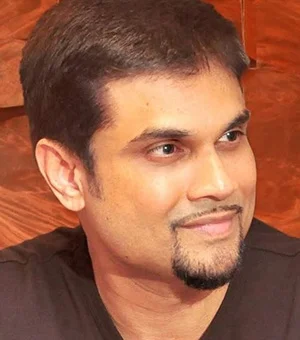
Janaka
Valentine’s Day should not be the only day we speak about love.
From the moment we are born into this world, we seek love, first through the very drop of our mother’s milk, then through the boundless care of our Mother and Father, and the embrace of family.
Love is everywhere. All living beings, even plants, respond in affection when they are loved.
As we grow, we learn to love, and to be loved. One day, that love inspires us to build a new family of our own.
Love has no beginning and no end. It flows through every stage of life, timeless, endless, and eternal.
Natasha Rathnayake (Singer)
We don’t have any special plans for Valentine’s Day. When you’ve been in love with the same person for over 25 years, you realise that love isn’t a performance reserved for one calendar date. My husband and I have never been big on public displays, or grand gestures, on 14th February. Our love is expressed quietly and consistently, in ordinary, uncelebrated moments.
With time, you learn that love isn’t about proving anything to the world or buying into a commercialised idea of romance—flowers that wilt, sweets that spike blood sugar, and gifts that impress briefly but add little real value. In today’s society, marketing often pushes the idea that love is proven by how much money you spend, and that buying things is treated as a sign of commitment.
Real love doesn’t need reminders or price tags. It lives in showing up every day, choosing each other on unromantic days, and nurturing the relationship intentionally and without an audience.
This isn’t a judgment on those who enjoy celebrating Valentine’s Day. It’s simply a personal choice.
Melloney Dassanayake (Miss Universe Sri Lanka 2024)
 I truly believe it’s beautiful to have a day specially dedicated to love. But, for me, Valentine’s Day goes far beyond romantic love alone. It celebrates every form of love we hold close to our hearts: the love for family, friends, and that one special person who makes life brighter. While 14th February gives us a moment to pause and celebrate, I always remind myself that love should never be limited to just one day. Every single day should feel like Valentine’s Day – constant reminder to the people we love that they are never alone, that they are valued, and that they matter.
I truly believe it’s beautiful to have a day specially dedicated to love. But, for me, Valentine’s Day goes far beyond romantic love alone. It celebrates every form of love we hold close to our hearts: the love for family, friends, and that one special person who makes life brighter. While 14th February gives us a moment to pause and celebrate, I always remind myself that love should never be limited to just one day. Every single day should feel like Valentine’s Day – constant reminder to the people we love that they are never alone, that they are valued, and that they matter.
I’m incredibly blessed because, for me, every day feels like Valentine’s Day. My special person makes sure of that through the smallest gestures, the quiet moments, and the simple reminders that love lives in the details. He shows me that it’s the little things that count, and that love doesn’t need grand stages to feel extraordinary. This Valentine’s Day, perfection would be something intimate and meaningful: a cozy picnic in our home garden, surrounded by nature, laughter, and warmth, followed by an abstract drawing session where we let our creativity flow freely. To me, that’s what love is – simple, soulful, expressive, and deeply personal. When love is real, every ordinary moment becomes magical.
Noshin De Silva (Actress)
Valentine’s Day is one of my favourite holidays! I love the décor, the hearts everywhere, the pinks and reds, heart-shaped chocolates, and roses all around. But honestly, I believe every day can be Valentine’s Day.
It doesn’t have to be just about romantic love. It’s a chance to celebrate love in all its forms with friends, family, or even by taking a little time for yourself.
Whether you’re spending the day with someone special or enjoying your own company, it’s a reminder to appreciate meaningful connections, show kindness, and lead with love every day.
And yes, I’m fully on theme this year with heart nail art and heart mehendi design!
Wishing everyone a very happy Valentine’s Day, but, remember, love yourself first, and don’t forget to treat yourself.
Sending my love to all of you.
Features
Banana and Aloe Vera

 To create a powerful, natural, and hydrating beauty mask that soothes inflammation, fights acne, and boosts skin radiance, mix a mashed banana with fresh aloe vera gel.
To create a powerful, natural, and hydrating beauty mask that soothes inflammation, fights acne, and boosts skin radiance, mix a mashed banana with fresh aloe vera gel.
This nutrient-rich blend acts as an antioxidant-packed anti-ageing treatment that also doubles as a nourishing, shiny hair mask.
* Face Masks for Glowing Skin:
Mix 01 ripe banana with 01 tablespoon of fresh aloe vera gel and apply this mixture to the face. Massage for a few minutes, leave for 15-20 minutes, and then rinse off for a glowing complexion.
* Acne and Soothing Mask:
Mix 01 tablespoon of fresh aloe vera gel with 1/2 a mashed banana and 01 teaspoon of honey. Apply this mixture to clean skin to calm inflammation, reduce redness, and hydrate dry, sensitive skin. Leave for 15-20 minutes, and rinse with warm water.
* Hair Treatment for Shine:
Mix 01 fresh ripe banana with 03 tablespoons of fresh aloe vera gel and 01 teaspoon of honey. Apply from scalp to ends, massage for 10-15 minutes and then let it dry for maximum absorption. Rinse thoroughly with cool water for soft, shiny, and frizz-free hair.
-

 Features4 days ago
Features4 days agoMy experience in turning around the Merchant Bank of Sri Lanka (MBSL) – Episode 3
-

 Business5 days ago
Business5 days agoZone24x7 enters 2026 with strong momentum, reinforcing its role as an enterprise AI and automation partner
-

 Business4 days ago
Business4 days agoRemotely conducted Business Forum in Paris attracts reputed French companies
-

 Business4 days ago
Business4 days agoFour runs, a thousand dreams: How a small-town school bowled its way into the record books
-

 Business4 days ago
Business4 days agoComBank and Hayleys Mobility redefine sustainable mobility with flexible leasing solutions
-

 Business1 day ago
Business1 day agoAutodoc 360 relocates to reinforce commitment to premium auto care
-

 Business5 days ago
Business5 days agoHNB recognized among Top 10 Best Employers of 2025 at the EFC National Best Employer Awards
-

 Business5 days ago
Business5 days agoGREAT 2025–2030: Sri Lanka’s Green ambition meets a grid reality check


